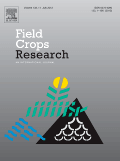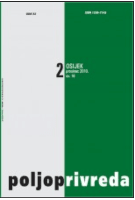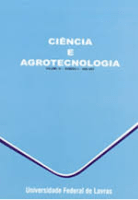
ACS Agricultural Science & Technology
Scope & Guideline
Driving Progress in Crop Science and Food Technology
Introduction
Aims and Scopes
- Sustainable Agricultural Practices:
Research emphasizing sustainable methods for crop production, including the use of bio-based fertilizers, controlled-release systems, and environmentally friendly pest management strategies. - Nanotechnology in Agriculture:
Exploration of nanomaterials and nanotechnology applications in agriculture, such as nanoencapsulation for pesticides and fertilizers, enhancing nutrient delivery, and improving crop resilience. - Plant Biotechnology and Genetic Engineering:
Studies on genetic modifications, CRISPR/Cas9 applications, and marker-assisted breeding aimed at improving crop traits such as yield, disease resistance, and stress tolerance. - Soil Health and Fertility Management:
Research focused on soil amendments, the impact of fertilizers on soil health, and the role of biochar and other organic materials in enhancing soil quality. - Pesticide and Agrochemical Management:
Investigation into the efficacy, safety, and environmental impact of pesticides and agrochemicals, including their residues in food and soil. - Food Safety and Quality:
Research aimed at ensuring food safety through the study of contaminants, pesticide residues, and methods for enhancing the nutritional quality of crops. - Climate Change and Environmental Impact:
Studies addressing the effects of climate change on agriculture, including strategies for adaptation and mitigation of environmental impacts.
Trending and Emerging
- Precision Agriculture and Data Science:
The integration of AI, machine learning, and data analytics in agriculture is rapidly growing, facilitating improved crop monitoring, disease detection, and resource management. - Biological Control and Biopesticides:
There is a marked increase in research on biological control methods and the development of biopesticides, promoting environmentally friendly pest management strategies. - Circular Economy in Agriculture:
Emerging studies focus on waste valorization, resource recovery, and sustainable practices that align with circular economy principles, aiming to reduce waste and enhance sustainability. - Plant-Microbe Interactions:
Research exploring the beneficial interactions between plants and microorganisms, including mycorrhizae and PGPR (Plant Growth-Promoting Rhizobacteria), is becoming increasingly prominent. - Climate Resilience and Adaptation Strategies:
There is a growing body of work on developing crop varieties and agricultural practices that enhance resilience to climate change, focusing on drought resistance, salinity tolerance, and other stress factors.
Declining or Waning
- Traditional Chemical Pest Control:
Research focusing solely on conventional chemical pesticides is declining, as there is a growing emphasis on integrated pest management and sustainable alternatives due to environmental concerns. - Low-tech Agricultural Practices:
Studies centered on outdated farming techniques are becoming less prominent as the focus shifts toward innovative, technology-driven solutions that enhance efficiency and sustainability. - Generalized Crop Management:
Research that lacks specificity or tailored approaches to crop management practices is fading, as there is a demand for more targeted studies that address the unique challenges of different crops and regions. - Single-Factor Studies:
Research that examines the effects of one variable in isolation is decreasing, with a trend towards multidisciplinary approaches that consider the interplay of various factors affecting agricultural systems.
Similar Journals

SPANISH JOURNAL OF AGRICULTURAL RESEARCH
Fostering Growth Through Open Access ResearchThe Spanish Journal of Agricultural Research (ISSN: 1695-971X, E-ISSN: 2171-9292), published by the prestigious Consejo Superior Investigaciones Cientificas (CSIC), serves as a vital resource for those engaged in the fields of agronomy and crop science. Established as an Open Access journal since 2003, it aims to foster the dissemination of innovative research and practical applications related to agricultural practices and sustainability. With its Q3 category in Agronomy and Crop Science and a Scopus ranking of #224 out of 406, the journal provides an accessible platform for scholars to share valuable findings that enhance agricultural productivity and environmental stewardship. Covering research from 2006 to 2024, this journal continues to be instrumental for researchers, professionals, and students eager to remain at the forefront of agricultural science advancements.

AIMS Agriculture and Food
Cultivating knowledge at the intersection of agriculture and food.AIMS Agriculture and Food is a leading open access journal published by the American Institute of Mathematical Sciences (AIMS), focused on the critical intersections of agricultural and food sciences. Since its inception in 2016, this journal has provided a vital platform for disseminating innovative research and advancements in the fields of agricultural and biological sciences and food science. With impressive Scopus rankings, including a Q2 categorization in 2023 for both Agricultural and Biological Sciences (miscellaneous) and Food Science, AIMS Agriculture and Food is recognized for its significant contributions to the academic community. The journal aims to foster interdisciplinary dialogue by welcoming submissions that tackle contemporary challenges, promote sustainable practices, and enhance food security. Researchers, professionals, and students will find this journal an invaluable resource, offering open access to high-quality, peer-reviewed articles that are essential for informed decision-making in agriculture and food industries.

FIELD CROPS RESEARCH
Empowering Farmers with Evidence-Based ResearchFIELD CROPS RESEARCH is a premier academic journal published by Elsevier, dedicated to advancing knowledge in the fields of Agronomy and Crop Science as well as Soil Science. Now in its 46th year of publication, this esteemed journal has established itself as a leading resource, holding a prestigious Q1 ranking in both the Agronomy and Soil Science categories, with a remarkable blend of rigorous peer-reviewed research and innovative findings. With a Scopus ranking of #27/406 in Agronomy and #20/159 in Soil Science, and a notable 93rd and 87th percentile respectively, FIELD CROPS RESEARCH plays a vital role in informing practices that drive sustainable agriculture and optimize crop production. Although not an open access journal, it remains highly accessible to the global research community and offers critical insights that influence policy and agricultural practices worldwide. Researchers, professionals, and students are encouraged to delve into this journal, as it continues to shape the future of field crop research through impactful studies and comprehensive reviews.

PAKISTAN JOURNAL OF AGRICULTURAL SCIENCES
Advancing Agricultural Research for a Greener TomorrowWelcome to the Pakistan Journal of Agricultural Sciences, a prominent platform for disseminating vital research findings in the fields of agronomy, crop science, food science, plant science, and soil science. Published by the prestigious University of Agriculture in Faisalabad, this journal aims to enhance the scientific discourse surrounding agricultural innovation and sustainability in Pakistan and beyond. With an ISSN of 0552-9034 and E-ISSN of 2076-0906, the journal serves as a valuable resource for researchers, professionals, and students interested in cutting-edge agricultural developments. As of 2023, the journal is ranked in the Q3 category for Agronomy and Crop Science as well as Food Science and positioned in Q4 for Plant and Soil Science, highlighting its growing impact within a competitive academic landscape. While the Pakistan Journal of Agricultural Sciences is not currently open access, it provides a comprehensive archive of research converging from 2011 to 2024, ensuring that critical knowledge remains accessible to those striving to advance the agricultural sciences. Join us in our mission to foster innovation and support sustainable practices in agriculture.

BRAGANTIA
Fostering Sustainable Solutions Through ScienceBRAGANTIA, published by the Instituto Agronômico, is a distinguished open access journal that has been a vital resource since its inception in 1977. With an ISSN of 0006-8705 and E-ISSN 1678-4499, this journal is recognized for its contributions to the field of Agricultural and Biological Sciences, where it currently holds a respectable Q2 ranking as of 2023. Additionally, BRAGANTIA is indexed in various databases, supporting its impact within Materials Science (Q3 ranking). Positioned in Brazil, the journal promotes the dissemination of high-quality research, aiming to bridge the gap between academia and practical applications in agricultural innovation and sustainability. Researchers, professionals, and students looking to keep abreast of recent advancements and their implications will find BRAGANTIA to be an indispensable platform for sharing and accessing vital agricultural knowledge.

Agrosystems Geosciences & Environment
Empowering knowledge generation in agricultural sciences.Agrosystems Geosciences & Environment, published by WILEY, is a premier open access journal dedicated to advancing the interdisciplinary field of agricultural and environmental sciences. With an E-ISSN of 2639-6696, the journal has gained recognition since its inception in 2018, currently holding a Q2 ranking in Agricultural and Biological Sciences, Plant Science, and Soil Science. Operating from the United Kingdom, Agrosystems Geosciences & Environment contributes significantly to knowledge generation and dissemination, offering vital insights into sustainable practices, soil management, and crop optimization. Researchers and professionals will find the open access model particularly advantageous, promoting greater visibility and engagement within the scientific community. By bridging the gap between geosciences and agrosystem management, this journal is vital for those committed to addressing today's critical environmental challenges.

Poljoprivreda
Empowering agronomy through open access research.Poljoprivreda is a distinguished open-access journal dedicated to the field of agronomy and crop science, published by the FAC Agriculture Osijek in Croatia. Since its inception in 2000, the journal has been committed to disseminating high-quality research that informs both academic and practical advancements in agriculture. With an ISSN of 1330-7142 and an E-ISSN of 1848-8080, Poljoprivreda provides a vital platform for researchers, professionals, and students to engage with the latest findings and methodologies in agronomy, contributing significantly to the enhancement of agricultural practices in Croatia and beyond. Although currently ranked in the 22nd percentile within its category according to Scopus, the journal aspires to elevate its standing by welcoming innovative research that addresses contemporary challenges within the agricultural sciences. By fostering open access since 2000, Poljoprivreda ensures that its scholarly content is freely available, promoting wider dissemination and collaborative opportunities among researchers globally.

Romanian Agricultural Research
Empowering Researchers to Transform Agricultural PracticesRomanian Agricultural Research is a prominent academic journal dedicated to advancing the field of agricultural science with a specific focus on agronomy and crop management. Published by the NATL AGRICULTURAL RESEARCH & DEVELOPMENT INST in Romania, this journal has established itself as an important resource within its discipline, evidenced by its Q3 ranking in the Agronomy and Crop Science category for 2023. With its ongoing publication since 2008, the journal provides a platform for researchers and professionals to disseminate their findings and share innovative practices that address the challenges faced in agricultural development. Although it operates under a non-open access model, Romanian Agricultural Research commits to rigorous peer-review processes, ensuring the high-quality content that enhances the academic community’s knowledge base. The journal's objective is to foster dialogues surrounding sustainable agriculture, improve crop yield, and contribute to the enhancement of agricultural practices globally. Researchers, professionals, and students will find this journal to be an invaluable repository of knowledge and a catalyst for future agricultural innovations.

CIENCIA E AGROTECNOLOGIA
Advancing Agricultural Innovation for a Sustainable FutureCIENCIA E AGROTECNOLOGIA, published by UNIV FEDERAL LAVRAS-UFLA, is a vital open-access journal since 2005 that serves as an influential platform for disseminating research in the fields of Agronomy, Animal Science, Food Science, Soil Science, and Veterinary Science. With its ISSN 1413-7054 and E-ISSN 1981-1829, this journal is recognized for its contribution to science and technology advancements in agriculture, particularly in Brazil, fostering knowledge exchange among researchers, professionals, and students. Currently ranked in the Q2 quartile for Agronomy and Crop Science, Animal Science and Zoology, and in the Q3 quartile for Food Science and Soil Science, it demonstrates a solid international standing in the relevant Scopus indices. The journal's commitment to open access ensures that critical research findings are freely available, enabling a broader impact and encouraging collaborative advancements in agritech. As the journal looks towards its converged years from 2007 to 2024, it continues to uphold its objectives of promoting sustainable practices and innovation within the agricultural sciences.

PHILIPPINE AGRICULTURAL SCIENTIST
Cultivating Knowledge, Nurturing Innovation.PHILIPPINE AGRICULTURAL SCIENTIST is a pioneering journal published by the University of the Philippines Los Baños, dedicated to advancing the fields of Agronomy, Crop Science, Animal Science, and Biotechnology. With an ISSN of 0031-7454, this esteemed journal provides a vital platform for researchers and practitioners focusing on agricultural innovations and practices in the Philippines and beyond. With a robust history dating back to 1996 and continuing through 2024, the journal operates within the Q4 quartile, reflecting its potential for growth and impactful contributions in its categories. Despite currently being positioned in the lower ranks, it serves as an essential publishing venue for nascent studies and localized research, contributing to the agricultural discourse. The journal fosters a collaborative research environment, encouraging submissions from both emerging scholars and seasoned experts, making it a valuable resource for students, professionals, and researchers engaged in the agricultural sciences. While it currently does not offer open access, it plays a crucial role in disseminating vital knowledge aimed at enhancing agricultural practices in the region.